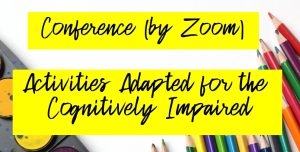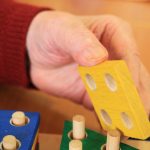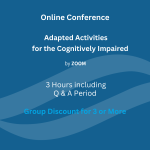
Montessori activities adapted for those with Alzheimer’s and other types of dementia represent an innovative and unique way of creating a greater constructive engagement and a sense of accomplishment in their daily lives.
In this article, we’ll tell you how Montessori-based activities help people with dementia.
Adapted environments (materials, lighting, etc.) are set up so as to allow people with Alzheimer’s to better connect with themselves on a physical and sensorial level.
The driving force behind these activities for people with dementia is based on respect, dignity and equality and are not meant simply to pass the time.
Benefits of Montessori Activities:
- Improve and maintain preserved capacities
- Relearn daily gestures
- Encourage self-expression; increase one’s creative expressions
- Foster emotional connections with others and enjoy increased social roles
- Reduce anxiety, irritability and disruptive behaviors
- Feel more engaged and in control of one’s life
- Reduced need for anti-depressant medication
- Stimulate past memories and emotions
- Increased level of independence and self-esteem
- Stronger communication skills due to higher engagement
- Greater positive rapport between staff and residents
- Greater participation in daily life activities be it in a home or residential setting
- Increased motor and cognitive abilities
Examples of how Montessori-based activities help people with dementia:
1.) An example of a skills-building activity that Dr. Cameron Camp employs involves people with dementia using a slotted spoon to dig in a tub of dry rice for objects that are buried beneath the surface.
When they find a “treasure,” the rice falls through the slots, leaving the object on the spoon. In the process, their brains are re-learning the motor skills that are necessary to feed themselves.
2.) In a nursing home in Europe, it had been common practice to physically restrain most residents with advanced dementia.
Once trained in the Montessori method, the management and staff arranged for their advanced-stage residents to be taken out of the residence every morning to purchase ingredients for the meals that were planned for their dinner. Once back at the residence, they took part in the preparation of the meal.
The results were dramatic. After 8 weeks, the staff reported that the use of restraints had dropped by 94%!
(Based on an example from ‘Montessori Life: Spring 2017’)
3.) In an LTC residence a woman living with dementia seemed to be very agitated whenever the staff came to announce the activities for the day.
The resident would not listen quietly. She made loud and offensive remarks while the staff member was reading the schedule making it difficult for the others to hear.
The Montessori-trained staff decided to have the activities schedule typed in large font and asked the resident if she would assist by reading the activities that were planned for the day. She was more than happy to do that and the problem was resolved.
Click the image to find out the date of our next conference…






